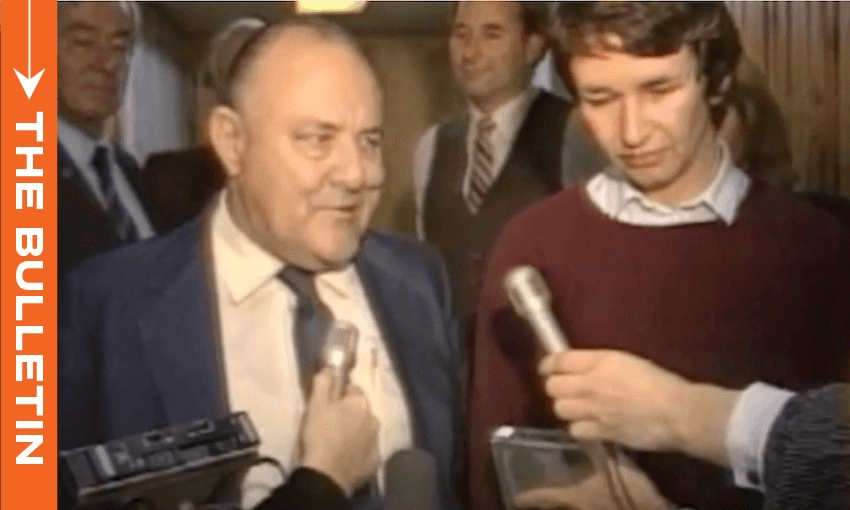It’s four decades since Robert Muldoon’s infamous decision to call a snap election, writes Stewart Sowman-Lund in this extract from The Bulletin. To receive The Bulletin in full each weekday, sign up here.
Four decades since the ‘schnapps’ election
Today marks 40 years since a visibly drunk Robert Muldoon called a snap election. It was a decision that, as The Spinoff’s new podcast Juggernaut examines in great detail, led to serious and enduring change in New Zealand. Given it’s the anniversary, I went back and read Newstalk ZB journalist Barry Soper’s account of what happened on June 14, 1984 – and it’s compelling. “Never before or since has a politician appeared in front of the television cameras in such a drunken state,” wrote Soper, who was there on the night. You only need to type the words “Robert Muldoon” into Papers Past to be presented with an array of reports from the night itself, like this from The Press. Considering the consequences the election triggered, they’re all quite soberly reported. I’ll leave an examination of the change that followed to Toby Manhire over the next six weeks of Juggernaut, but given it’s the anniversary of one of the most iconic moments in our political history, let’s look at some of the similarities between 1984 and 2024.
‘We’re in as much trouble today as we were in 1984’
That’s according to former Labour finance spokesperson, and later Act Party co-founder, Roger Douglas. As Manhire describes it to me, Roger Douglas just won’t quit. “When he came into The Spinoff to talk about the fourth Labour government and his role in those tumultuous years for our new podcast Juggernaut, he was just as keen to get stuck into the here and now.” As you can read on The Spinoff this morning, Douglas reckons things are as dire now as they were in 1984 and demand another radical response.
According to Douglas, the parallels are clear. In 1984, Douglas and the new Labour government inherited an economy in crisis. The coalition government of 2023 has made similar comments. In late 2023, Willis said the government books laid bare “the extent of Labour’s economic and fiscal vandalism”. Douglas told Manhire: “We’re in as much trouble today as we were in 1984.” Douglas has urged radical action to address today’s crises, something Willis has erred away from. “We don’t want to be radical,” she told Mike Hosking ahead of budget day.
In 2023, Douglas penned an open letter, first reported by BusinessDesk, that questioned why the party he co-founded was not responding more aggressively to the current challenges. In response, David Seymour told The Spinoff he acknowledged Act was not as “radical” as Douglas may have wanted.
The ‘strands’ that link two eras
Manhire tells me there are other “strands” that connect the fourth Labour government and today. “Whether it’s a specific (such as the drafting of Treaty principles) or a theme (eg prime ministers finding life more agreeable abroad than at home) there are links all over the show,” he says. “And of course the biggie, the perennial: the question over just how active a role the state should have in our lives.” In 1989, the fourth Labour government became the first to set out principles to guide its actions on matters relating to the Treaty of Waitangi, as Te Ara explains here. It remains a hot button topic, thanks to an Act proposal inked into the coalition agreement with National to redefine the principles and set them in stone via legislation. Victoria University’s Luke Fitzmaurice-Brown looked back at the history of the principles in this Newsroom piece earlier in the year, but in recent weeks we’ve taken a step forward to that bill becoming a reality (though National has ruled out taking it beyond first reading). In May, 1News’ Te Aniwa Hurihanganui reported that the coalition had started the process of reviewing at least 40 pieces of legislation that included Treaty principles clauses, something that was agreed between National and New Zealand First.
The other parallel? The snap election itself
One other connection between the two eras is further afield: the idea of a snap election. In France, Emmanuel Macron recently announced that following a poor result in the European Union elections, he would be putting his leadership on the line earlier than anticipated. As The Guardian explained, Macron described his decision to go to a vote as an “act of confidence”, believing that the French people would “make the best choice for themselves and for future generations”. The Spinoff’s Catherine McGregor went into more depth in this week’s edition of The World Bulletin (which you can access as a Spinoff Member), explaining that the president is wanting to test France’s “readiness” for the far right, or prove that the recent election result was simply a “letting-off of steam”.
While certainly emboldened by alcohol, Muldoon similarly called the 1984 election to try to prove he had a mandate and to dispel criticism over the state of the economy. But as BusinessDesk’s Pattrick Smellie wrote last year, when there were murmurings of Chris Hipkins calling a snap election, voters tend not to think kindly of an unexpected trip to the polls. The rest is history. Though less a “snap” election and more a slightly unexpected one, it’s just three weeks until the UK heads out to vote. The latest debate between prime ministerial contenders Keir Starmer and Rishi Sunak took place yesterday, and I highly recommend this report from The Guardian’s Marina Hyde on what unfolded.
Listen to Juggernaut: The Story of the Fourth Labour Government here.


